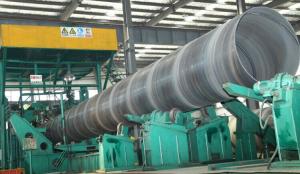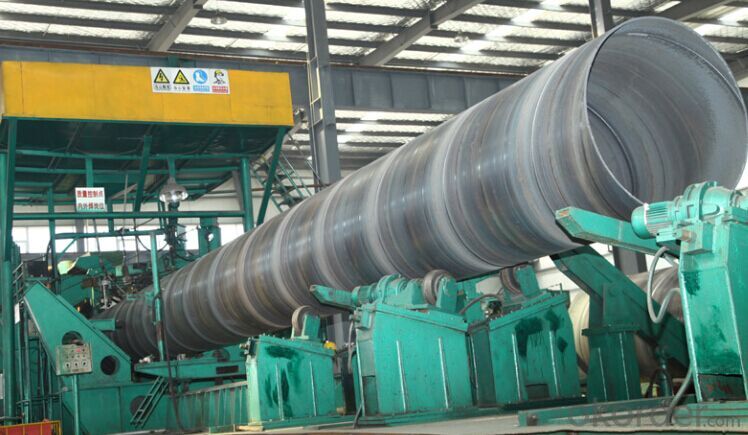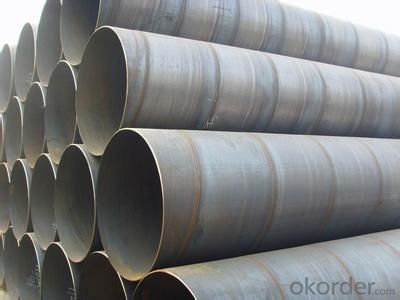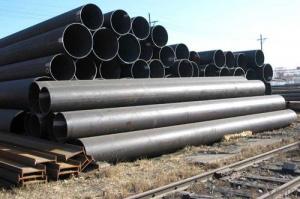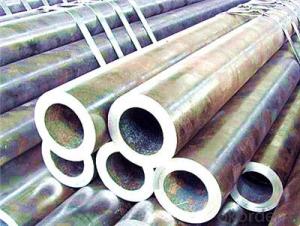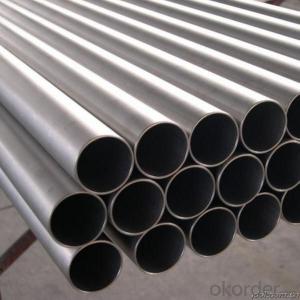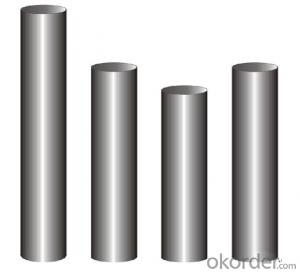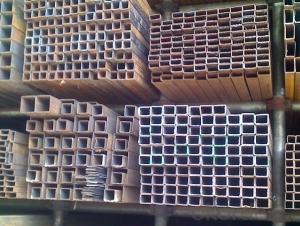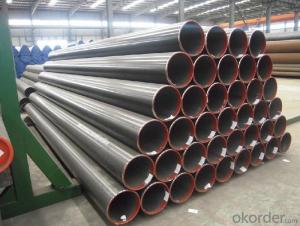SSAW Steel Pipe Made in China for building
- Loading Port:
- Tianjin
- Payment Terms:
- TT or LC
- Min Order Qty:
- 25 m.t.
- Supply Capability:
- 10000 m.t./month
OKorder Service Pledge
OKorder Financial Service
You Might Also Like
1、Structure of High Quality SSAW Steel Pipe Made in China:
Seamless pipe is formed by drawing a solid billet over a piercing rod to create the hollow shell. As the manufacturing process does not include any welding, seamless pipes are perceived to be stronger and more reliable. Historically seamless pipe was regarded as withstanding pressure better than other types, and was often more easily available than welded pipe.
2、High Quality SSAW Steel Pipe Made in China:
• High manufacturing accuracy
• High strength
• Small inertia resistance
• Strong heat dissipation ability
• Good visual effect
• Reasonable price
3、High Quality SSAW Steel Pipe Made in China Specification:
Standard | GB, DIN, ASTM ASTM A106-2006, ASTM A53-2007 |
Grade | 10#-45#, 16Mn 10#, 20#, 45#, 16Mn |
Thickness | 8 - 33 mm |
Section Shape | Round |
Outer Diameter | 133 - 219 mm |
Place of Origin | Shandong, China (Mainland) |
Secondary Or Not | Non-secondary |
Application | Hydraulic Pipe |
Technique | Cold Drawn |
Certification | API |
Surface Treatment | factory state or painted black |
Special Pipe | API Pipe |
Alloy Or Not | Non-alloy |
Length | 5-12M |
Outer Diameter | 21.3-610mm |
Grade | 20#, 45#, Q345, API J55, API K55, API L80, API N80, API P110, A53B |
Standard | ASME, ASTM |
1) Material:20#(ASTM A 106/A53 GRB.API5LGRB,GB),45#,16Mn,10#.
2) Specification range:OD:21.3-610mm,WT:6-70mm,length:6-12m or according to the requirement of clients.
3) Excutive standards:GB,ASME API5L.ASTM A 106/A53,Despite of the above standards,we can also supply seamless steel pipe with standard of DIN,JIS,and so on,and also develop new products according to the requirements of our clients!
4) Surface:black lacquered,varnish coating or galvanized.
5) Ends:Beveled or square cut,plastic capped,painted.
6) Packing:bundles wrapped with strong steel strip,seaworthy packing.
4、Packaging & Delivery
Packaging Details: | seaworthy package,bundles wrapped with strong steel strip |
Delivery Detail: | 15-30days after received 30%TT |
5、FAQ of High Quality SSAW Steel Pipe Made in China:
①How is the quality of your products?
Our products are manufactured strictly according to national and internaional standard, and we take a test
on every pipe before delivered out. If you want see our quality certifications and all kinds of testing report, please just ask us for it.
Guaranteed: If products’ quality don’t accord to discription as we give or the promise before you place order, we promise 100% refund.
②How about price?
Yes, we are factory and be able to give you lowest price below market one, and we have a policy that “ for saving time and absolutely honest business attitude, we quote as lowest as possible for any customer, and discount can be given according to quantity”,if you like bargain and factory price is not low enough as you think, just don’t waste your time.Please trust the quotation we would give you, it is professional one.
③Why should you chose us?
Chose happens because of quality, then price, We can give you both.Additionally, we can also offer professional products inquiry, products knowledge train(for agents), smooth goods delivery, exellent customer solution proposals.Our service formula: good quality+good price+good service=customer’s trust
SGS test is available, customer inspection before shipping is welcome, third party inspection is no problem.
6.Images
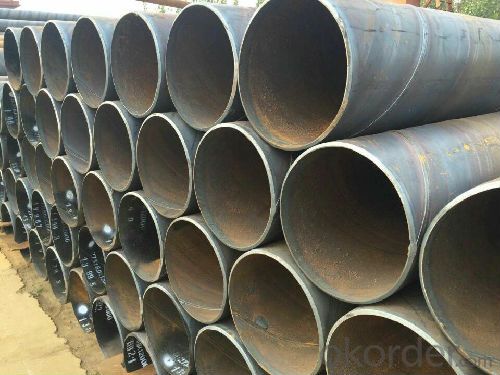
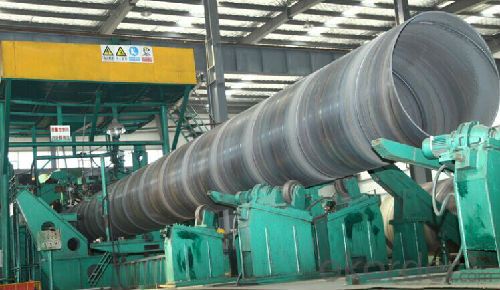
- Q: What is the difference between black steel pipes and galvanized steel pipes?
- Black steel pipes are made of carbon steel and are typically used in gas or oil lines, while galvanized steel pipes are coated with a layer of zinc to protect against corrosion. Galvanized pipes are commonly used in plumbing systems and outdoor applications.
- Q: What are the common sizes of steel pipes?
- Common sizes of steel pipes can vary depending on the application, but some common sizes include 1/2 inch, 3/4 inch, 1 inch, 1.5 inches, 2 inches, 3 inches, 4 inches, 6 inches, 8 inches, 10 inches, and 12 inches in diameter.
- Q: Can steel pipes be used for underwater applications?
- Yes, steel pipes can be used for underwater applications. Steel is a strong and durable material that can withstand the harsh conditions of underwater environments, making it suitable for various applications such as offshore oil and gas exploration, underwater construction, and marine infrastructure. Additionally, steel pipes can be coated with protective layers to prevent corrosion and ensure long-term performance underwater.
- Q: A333gr6 steel pipe and domestic material of the same?
- A333Gr.6 steel is no nickel steel is a kind of fine grain aluminum low temperature toughness of steel, therefore, also called Al killed steel. A333Gr.6 belongs to the United States ANSI and ASTM-SA333 cryogenic steel standards and is used at the lowest impact temperature of -46 degrees celsius. Its temperature, range of use and fracture toughness value are similar to those of domestic 16Mn steel (the minimum usage temperature of 16Mn steel is -40 degrees Celsius).
- Q: What connections are there for concrete filled steel tubular column foundations?
- In the connection work, strengthening ring joint stiffness, high bearing capacity and no parts through the tube, it is especially suitable for the small diameter steel tube concrete column structure, complex engineering projects, especially those in the pump sending pouring construction method, which is more important, it has a basic guarantee strictly for the quality of concrete construction. When concrete columns with larger diameter, ring type joint construction steel is large strengthened, so as to make the project construction become more complex, and the connection between the longitudinal rebars becomes cumbersome.
- Q: What are the factors to consider when selecting steel pipes for a specific application?
- When selecting steel pipes for a specific application, there are several factors to consider. The first is the type of steel needed, which can vary based on factors such as the desired strength, corrosion resistance, and temperature resistance. Secondly, the size and dimensions of the pipes should be evaluated to ensure they meet the requirements of the application. Additionally, the specific application's operating conditions, such as pressure, temperature, and environment, should be taken into account. The manufacturing process and quality standards of the steel pipes, as well as the supplier's reputation and reliability, should also be considered. Lastly, cost-effectiveness and budget constraints are essential factors to keep in mind when selecting steel pipes for a specific application.
- Q: How are steel pipes inspected for quality?
- Steel pipes are inspected for quality through various methods such as visual inspection, non-destructive testing techniques like ultrasonic testing, magnetic particle inspection, and radiographic testing. These inspections help identify any defects, cracks, or imperfections in the pipes, ensuring they meet the required quality standards. Additionally, mechanical tests such as tensile strength and hardness tests may also be conducted to assess the structural integrity of the steel pipes.
- Q: What are the common methods for inspecting the condition of steel pipes?
- Steel pipes can be inspected using a variety of methods to ensure their condition and integrity. These methods aim to identify any issues or defects that could potentially affect the pipes. 1. Visual Inspection: Inspectors thoroughly examine the pipes visually to spot any visible signs of damage such as corrosion, cracks, or leaks. They may employ tools like flashlights, mirrors, or borescopes to reach difficult areas. 2. Ultrasonic Testing: This method utilizes high-frequency sound waves to detect defects within the steel pipes. A transducer emits sound waves, and disruptions or reflections in these waves can indicate potential issues like cracks or thinning of the pipe walls. 3. Magnetic Particle Testing: Primarily used to detect surface cracks or defects, this technique applies a magnetic field to the pipe. Fine iron particles are then applied to the surface, and they accumulate at areas with surface defects, making them clearly visible. 4. Eddy Current Testing: This non-destructive testing method detects surface and near-surface defects in steel pipes. It involves passing an alternating current through a coil, inducing eddy currents in the pipe. Disruptions or changes in these eddy currents can indicate defects like corrosion or cracks. 5. Radiographic Testing: X-rays or gamma rays are used in this method to inspect the internal structure of steel pipes. X-ray film or a digital detector is placed on one side of the pipe, while the X-ray source is positioned on the other side. The rays penetrate the steel, and any irregularities or defects can be identified on the film or through digital imaging. 6. Dye Penetrant Inspection: This technique is employed to detect surface-breaking defects in steel pipes. A dye penetrant is applied to the pipe's surface, and after a specified time, a developer is used to draw out the dye from any defects, making them easily visible. Whether used individually or in combination, these methods provide a comprehensive inspection of steel pipes, ensuring their reliability and safety in industries like oil and gas, construction, and manufacturing.
- Q: How are steel pipes used in the construction industry?
- Steel pipes are commonly used in the construction industry for various purposes such as transporting fluids, structural support, and underground installations. They are utilized in plumbing systems, HVAC systems, and for conveying water, oil, and gas. Additionally, steel pipes are employed in the construction of high-rise buildings, bridges, and other infrastructure projects due to their durability, strength, and resistance to corrosion.
- Q: How are steel pipes used in the manufacturing of agricultural machinery and equipment?
- Steel pipes are widely used in the manufacturing of agricultural machinery and equipment due to their various beneficial properties. These pipes are utilized in several ways to enhance the efficiency and durability of agricultural machinery. One of the primary uses of steel pipes in agricultural machinery is for the construction of frames and chassis. The high strength and structural integrity of steel pipes make them ideal for supporting heavy loads and withstanding the rigorous conditions often encountered in agricultural operations. Whether it is a tractor, combine harvester, or tillage equipment, steel pipe frames provide the necessary stability and sturdiness required for these machines to perform efficiently in the field. Steel pipes are also commonly used in the hydraulic systems of agricultural machinery. These pipes serve as conduits for hydraulic fluids, allowing for the smooth and reliable operation of various components such as hydraulic cylinders, pumps, and motors. Due to their resistance to corrosion and high pressure, steel pipes ensure the longevity of hydraulic systems, reducing maintenance and repair costs for agricultural machinery. Furthermore, steel pipes find applications in the exhaust systems of agricultural equipment. The exhaust gases produced by engines need to be safely and efficiently expelled to minimize environmental impact and maintain engine performance. Steel pipes with appropriate thickness and thermal resistance are used to construct exhaust systems, allowing for the effective removal of exhaust gases and reducing noise pollution. In addition, steel pipes are utilized in the manufacturing of irrigation systems and equipment used in agriculture. Whether it is for transporting water from a source to the fields or distributing water to crops through sprinklers or drip irrigation, steel pipes offer the necessary durability and resistance to pressure, ensuring efficient water delivery and minimizing leaks. Overall, the use of steel pipes in the manufacturing of agricultural machinery and equipment is crucial for enhancing their performance, durability, and efficiency. The strength, structural integrity, resistance to corrosion, and high pressure capabilities of steel pipes make them indispensable components in various applications within the agricultural sector.
Send your message to us
SSAW Steel Pipe Made in China for building
- Loading Port:
- Tianjin
- Payment Terms:
- TT or LC
- Min Order Qty:
- 25 m.t.
- Supply Capability:
- 10000 m.t./month
OKorder Service Pledge
OKorder Financial Service
Similar products
Hot products
Hot Searches
Related keywords
